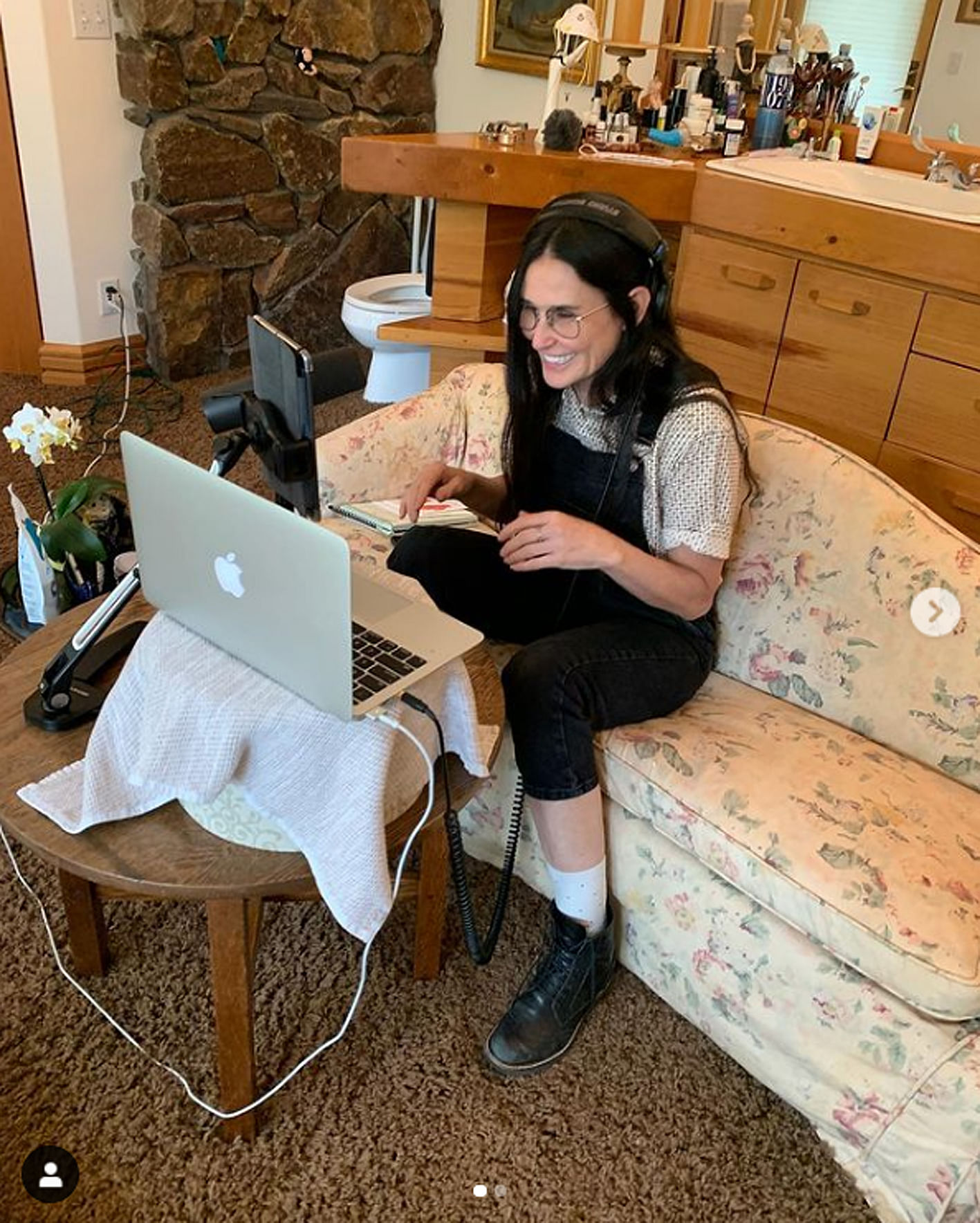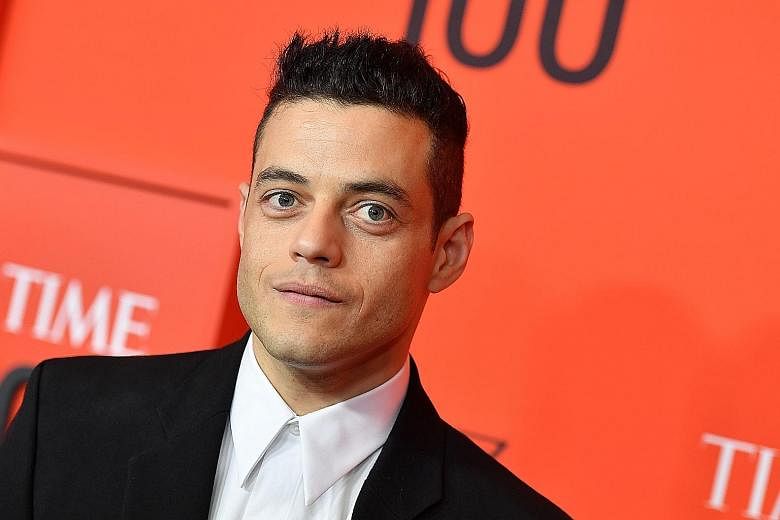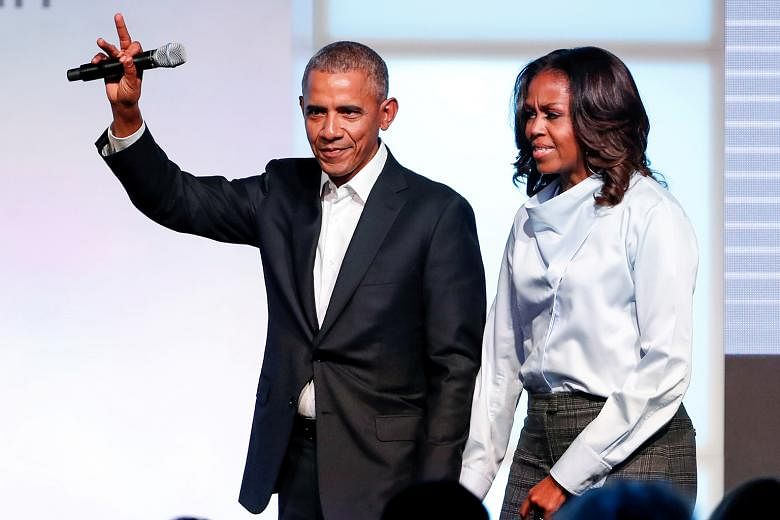WASHINGTON • Cooped up like many people, movie stars, politicians and reality show types eager to hold on to their fans are turning to podcasts to get through the coronavirus pandemic, converting their homes - even a bathroom in one case - into makeshift recording studios.
There is something out there for everyone.
While actress Demi Moore, with her trademark raspy voice, headlines an erotic podcast called Dirty Diana, actress Jamie Lee Curtis and actor Matthew McConaughey read stories for kids.
Former United States first lady Michelle Obama talks about personal issues in a podcast called The Michelle Obama Podcast, while actors Jason Bateman, Sean Hayes and Will Arnett interview other celebrities on one called SmartLess.
Ex-US president Donald Trump's former personal lawyer Michael Cohen has been waging a crusade against him since September in a podcast called Mea Culpa.
Britain's Prince Harry and his wife, Meghan Markle, have one too.
The first episode featured contributions from prominent people talking about how they are coping with the pandemic and what they are learning from it.
Reality show stars are also in on the craze.
Paris Hilton is scheduled to launch a podcast through radio giant iHeartMedia later this month.
Kim Kardashian has signed a deal this summer with Spotify to develop a show on criminal justice reform, a cause in which she has been active.
While podcasts with stars are nothing new, their sudden abundance is a natural consequence of the pandemic, said Mr Nicholas Quah, creator of a blog called Hot Pod.
With Hollywood largely shut down because of the pandemic, "so many of these celebrities are unable to get television or film productions going", he said. "This is an opportunity for these people to still reach fans and reach people."
NO NEED FOR A SET OR WARDROBE

Many are drawn by the flexibility of podcasts because there is no need for a set, camera or special wardrobe, and doing them is safe, Covid-19-wise.
For the sexy podcast Dirty Diana, co-produced by media and podcast company start-up QCode, the actors recorded themselves at home, said the company's co-founder Rob Herting.
For the best sound, he said, "they had to find a great room in their house. And for Demi, it was the bathroom".
"It ended up being a lot of fun and we certainly have had other actors recording in closets or whatever has the best acoustics."
What is more, podcasts can be made relatively quickly and cheaply. Dirty Diana, for instance, was recorded in May and released in July, whereas once a movie is shot, it can take a couple of years for it to come out.
The average budget for a QCode podcast, some of which feature Oscar-winning actors like Rami Malek, is in the low-to mid-six figures, while even a low budget movie needs maybe a million dollars, said Mr Herting.
Revenue from the podcast industry is still far smaller than that of movies, television or music, even if podcasts are all the rage now.
Advertisement revenue from podcasts should rise by 15 per cent last year once figures are in and approach a billion dollars, said a study published in July by PricewaterhouseCoopers.
"This is now a space some entertainment industry people see as a worthwhile investment. That was not necessarily 100 per cent the case previously," said Mr Quah.
"It's bad in the sense that a lot of the advertiser money, which would have been going to people who were in the space for the long term, ends up going to them first," he added, referring to the celebrities.
STAYING IN THE LIMELIGHT
Mr Quah said: "I think most celebrities who come in, they would probably think it's an extension of their brand. It's just for the celebrity to stay in your attention, whether they're going to sell you a book or not, as long as they still have your attention."
However, podcast studios like projects with stars because their fans guarantee an audience and these shows offer the possibility of being adapted to film or TV.
Amazon, for instance, is getting ready to turn Dirty Diana into a TV series starring Moore.
But will the podcast boom last after pandemic lifestyles end and stars go back to making movies and such?
Yes, said Mr Herting.
"The time commitment for an actor is just so low," said the boss of QCode, which plans to launch more than a dozen star-studded podcasts in the coming year.
But Mr Colin Anderson of Stitcher, which produces a comedy podcast featuring actor Rob Lowe, warned of the risk of saturation of "just famous people talking to other famous people".
"Celebrities are going to have to be more creative with the podcasts they launch and give people a more compelling reason than just their celebrity to subscribe," he said.
AGENCE FRANCE-PRESSE


